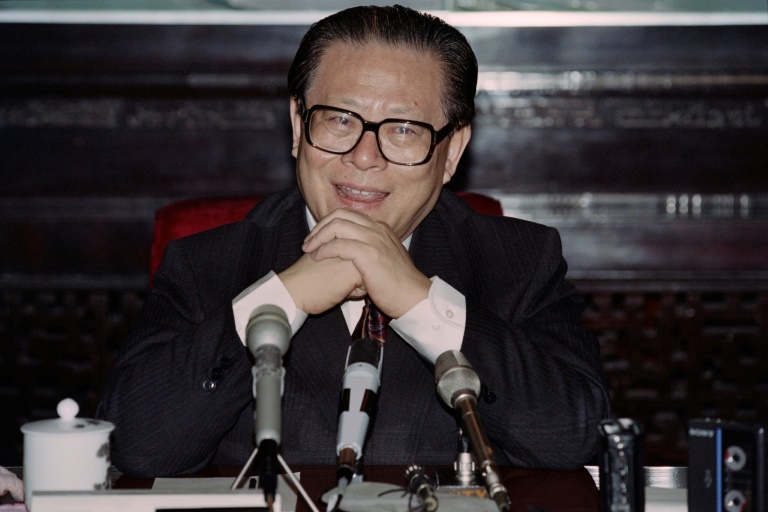China's former leader Jiang Zemin died in Shanghai of leukaemia and multiple organ failure on November 30, 2022
Sirens wailed across China as the Communist Party eulogised late leader Jiang Zemin Tuesday, hailing him as a patriot who “dedicated his life” to the country.
China’s rulers orchestrated a day of mourning across the country, with security services ensuring there were no large gatherings on the streets following rare protests in recent weeks.
Jiang died in Shanghai last Wednesday at the age of 96 and left a mixed legacy, taking power in the aftermath of the 1989 Tiananmen Square crackdown and leading China towards its emergence as a powerhouse on the global stage.
A public memorial service attended by China’s political elite began at 10:00 am (0200 GMT) in Beijing’s Great Hall of the People, bedecked with a giant portrait of the late leader as well as slogans lauding him and a massive flower display.
“He dedicated his whole life and energy to the Chinese people, dedicated his life to fighting for national independence, people’s liberation, national prosperity, and people’s happiness,” President Xi Jinping told assembled party faithful at the hall.
“The CCP Central Committee calls on the whole Party, the army and the people of all ethnic groups in China to turn grief into strength,” Xi added.
Looking frail and distraught, Jiang’s wife Wang Yeping sat in a wheelchair in the front row.
A nationwide “three-minute silence” was held as sirens sounded.
In Jiang’s hometown of Yangzhou, around 100 people gathered in front of his former residence to observe the silence after which they were swiftly dispersed by police.
Flags across the country were at half-mast as were those at Chinese government buildings overseas.
– ‘Deep feelings’ –
Stock markets in Shanghai and Shenzhen suspended trading for three minutes, as did the Chinese Gold and Silver Exchange in Hong Kong.
Hong Kong’s bourse suspended the display of data on external screens at its offices while senior executives observed the silence.
And in the semi-autonomous city’s harbour, hundreds of vessels honked for three minutes, while officials and government employees observed three minutes of silence.
At Scientia Secondary School in Hong Kong, hundreds of students and teachers gathered for an hour-long commemoration of Jiang, whose tenure saw Britain hand sovereignty of the southern city to China.
“We Hongkongers have deep feelings for President Jiang, who has visited Hong Kong many times, including attending the ceremony of Hong Kong’s handover,” one of the teachers said.
Students stood as China’s national flag was lowered to half-mast, before being shown the live broadcast of the memorial in Beijing.
Student Kate Leung, 16, said she observed the moment of silence “with gratitude” to Jiang’s contributions and called him a “very important leader”.
Public entertainment in mainland China was also suspended on Tuesday, with some online games such as the popular League of Legends announcing a day’s pause.
– Mixed legacy –
Jiang leaves a controversial legacy.
State media has hailed him as a great communist revolutionary, highlighting his part in quelling “serious political turmoil”.
But his rule also saw the repression of political opposition and religious minorities, as well as a tolerance for the widespread corruption that accompanied China’s economic rise.
Jiang died of leukaemia and multiple organ failure after medical treatments failed, according to state media.
His body was cremated Monday in Beijing at a ceremony attended by President Xi and other top leaders, Xinhua said.
Former leader Hu Jintao — who was escorted out of a top Communist Party meeting in October in an imbroglio that grabbed global attention — also reportedly attended in his first public appearance since the incident.
– Nostalgia –
The anti-Covid lockdown protests that flared up in China last week were the most widespread public demonstrations in the country since rallies calling for political reform in 1989.
And despite Jiang’s role in helping to crush the 1989 rallies, his death has prompted nostalgia among some Chinese for a time seen as more liberal and tolerant of dissent.
“The Jiang era, while not the most prosperous era, was a more tolerant one,” one user on the Twitter-like Weibo wrote following his death.
“I have heard many criticisms of him, but the fact that he allowed critical voices to exist shows how he is worthy of praise,” wrote another.
In retirement, Jiang had become the subject of light-hearted memes among millennial and Gen Z Chinese fans, who called themselves “toad worshippers” in reference to his frog-like countenance and quirky mannerisms.
More than half a million comments flooded CCTV’s post announcing his death on Weibo within an hour, many referring to him as “Grandpa Jiang”.
After the announcement, the websites of state media and government-owned businesses turned black-and-white, as did apps such as Alipay, Taobao and even McDonald’s China.










